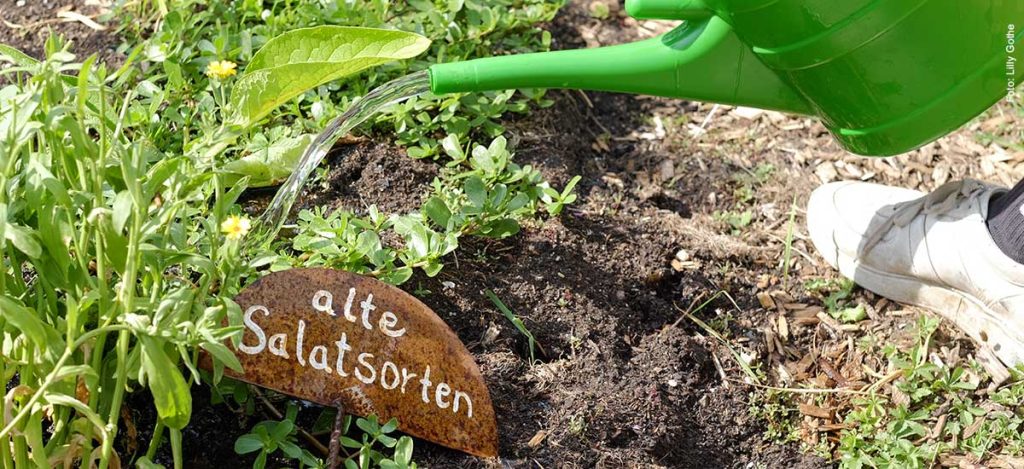It is not enough to have knowledge of ecological crises and social injustices, and thus the insight into the need for profound change in our way of life. We must also put into practice our findings on how to make the world more sustainable. To coordinate and intensify its own contribution to this social-ecological transformation, Goethe University has established a dedicated Sustainability Office. The new organizational unit within the University’s administration has been fully staffed since this summer. Supporting its five permanent employees are four student assistants, whose input serves as an important source of inspiration.

“Today, society is confronted with far-reaching ecological, social and economic challenges on a daily basis. In their capacity as research institutions, places of education and training, and as social actors, universities have a responsibility not only to provide decisive impetus for the future viability of societies. They also have to set an example themselves,“ says Goethe University President Prof. Enrico Schleiff, emphasizing the relevance of the sustainability topic. To that effect, the Executive Board has defined the „development of Goethe University into a sustainable university“ as one of the university’s eleven strategic areas of action for the coming years. The establishment of the Sustainability Office is a first important step in this direction. Like the Equal Opportunities Office, the newly created unit is embedded at the central administrative level, and in future will coordinate the various processes linked to the topic of sustainability.
Cross-cutting issue impacts all areas of the university
In its final report, „Our Common Future“, published in 1987, the Brundtland Commission established sustainability as the decisive indicator for shaping the future. Sustainability was defined as a development that meets the needs of the present without compromising the ability of future generations to meet their own needs. The United Nations refined this underlying idea and on September 25, 2015, adopted the Sustainable Development Goals (SDGs) at the 70th UN General Assembly in New York: The SDGs constitute an attempt to implement a sustainable development agenda by 2030 that is guided by the observance of comprehensive human rights within planetary boundaries.
Goethe University is no stranger to the scientific debate on sustainability issues. However, the science system is responsible for more than mere knowledge creation. Public organizations increasingly are questioning their own scope of action and the associated structures, both of which have an impact on society.
What does it mean in concrete terms to be a sustainable university? To answer that question all it takes is a quick look at everyday university life. It starts with on the way to a lecture: Is the campus well connected to the public transport network, are there bicycle parking spaces or showers for cyclists? In the daily office life of employees, for example, related questions concern, among others, procurement and recycling: How much and what kind of paper do we use? What happens to phased out technical equipment? While it is comparatively easy to answer questions of this kind, other issues are far more complicated: Are we preparing our students comprehensively for a complex and ever more rapidly changing world? Can they examine sustainability issues in different dimensions and relate them to their subjects or learning? What research foci do scientists choose and what consideration is given to topics that are of overriding social relevance and can advance a society as a whole? As a cross-cutting issue, sustainability impacts all areas of the university – which is why the answers to these questions can only be found together, in a constructive discourse with all stakeholders.
Ideas and suggestions welcome
Within the university, the Sustainability Offices fundamentally systematizes the exchange about the challenges of sustainable development. Rather than starting from scratch, the team is able to build on the preliminary work of colleagues in real estate management, the student initiative „Goethe’s Green Office“ (see info box), and the sustainability working group set up by the University Senate, which connects Goethe University experts and existing projects and facilitates the exchange of ideas.
For now, Goethe University’s Sustainability Office will act in an advisory capacity. Says Dr. Johannes Reidel, head of the new unit: „Needless to say, just because Goethe University has set up a Sustainability Office does not automatically make the university sustainable. As a team, we can point out the respective sustainability aspects in the relevant areas using current standards and empirical values, issue recommendations and provide concrete impetus for action in one field or another. Implementation, however, is not up to us (alone); we are dependent on the active cooperation of all university members.“ His colleague Peggy Feige adds: „Especially now, in our early days, we are happy to receive ideas and suggestions.”
With the longer term in mind
The Sustainability Office’s mandate is based on both legal requirements and strategic decisions: As such, when it comes to campus operations, the reduction of greenhouse gas emissions is just as important as the reduction in the use of resources. The office is already involved in the development of energy-saving measures implemented in the short term for the upcoming winter semester, and intends to continue the cooperation with a view to ensuring these measures have a longer-term effect.
With respect to research and teaching, the Sustainability Office supports the content-related and methodical examination of current social challenges. For example, it was able to make a small contribution to the call for funding proposals for quality assurance in teaching (QSL project funds). Half of the funds are dedicated to the topic of sustainability, whereby the focus is not limited to a content-related analysis of the topic, but also includes teaching key competencies and developing transdisciplinary and transformative teaching and learning environments.
In the coming months, with the participation of all status groups, the team will develop a university-wide sustainability strategy on behalf of the Executive Board. A first opportunity to get actively involved will be on November 22: The Sustainability Office invites all interested parties to a kick-off event in the Festsaal on the Westend Campus to discuss the state and outlook of sustainability at Goethe University together.
Editor: Lilly Gothe, Goethe University Sustainability Office
GOETHE‘S GREEN OFFICE / Goethe University students were key drivers in the “bottom-up” institutionalization of the sustainability office: Since 2018, the student initiative „Goethe’s Green Office“ (GGO) has been advocating for a social-ecological transformation of the university, calling for comprehensive changes in social structures. The first starting point is their own university. This group of students has since implemented a number of things: for example, in the 2019 winter semester, it organized a Public Climate School in cooperation with Students for Future, as well as a student general assembly. In 2021, it helped establish student community gardens on the Riedberg and Westend campuses. The GGO members also organize the Sustainability Working Group convened by the Senate, creating a central communication platform for sustainability at Goethe University. As one of the initiative’s main goals, the founding of the Sustainability Office received great support by three GGO members, who have joined the new team as student assistants.
Additional information: http://www.goethesgreenoffice.de (in German), Sustainability Office
Sustainability Overview: Goethe-Universität — Sustainability at Goethe-Universität (goethe-university-frankfurt.de)








